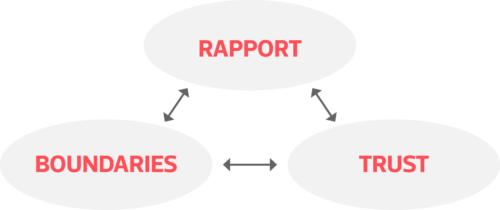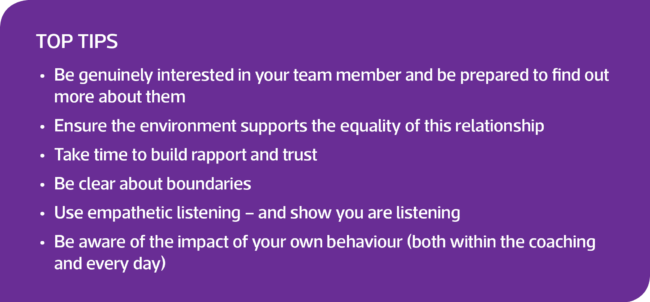Coaching Essential: Building Rapport
The Coaching Relationship
An effective coaching relationship is one which is focused on the team member’s issue, encourages their confidence, and stretches their thinking in order to reach a great outcome. To achieve that, the coaching manager needs to invest time in building a safe and positive space in which to work. The three cornerstones for this are Rapport, Trust and Boundaries:

Sometimes, we become too focused on achieving results rather than investing time in making sure these elements are in place, but without them we do not build a strong enough platform for effective coaching to occur.
Rapport
Rapport is fundamental in building the effective relationship between coach and team member as it promotes trust and allows trust to develop. Sometimes you will find you naturally get on well with someone, whilst with others it is possible to build rapport through finding common ground and being empathetic.
Rapport and Trust
Trust is an outcome of an effective relationship and good rapport between coaching manager and team member.
Trust has both emotional and rational elements: emotionally, it involves someone being able to be open and honest about their vulnerabilities with another person, and, at the same time, candidly viewing the other person and deciding whether they are likely to behave predictably or in a ‘trust-worthy’ way.
To develop trust, rapport must be non-judgemental, without placing your own value judgements on your team member or their actions, and you should be genuinely curious about their interests and concerns: This helps to create the conditions where they will feel able to explore their experience, thinking, wisdom and insights.
Rapport and Boundaries
Finally, it should be remembered that clear and agreed boundaries allow rapport to develop appropriately and are a cornerstone in any good coaching relationship.
Care must be taken to ensure that boundaries are not broken by one person ‘overstepping the mark,’ and in coaching a key issue to agree on is confidentiality, i.e. confirming that you will not talk about your conversation to anyone else without prior agreement (such as it being recorded for assessment of your coaching skills).
Capabilities for building rapport include:
- Ensuring your team member understands that in this conversation you are equal partners having a mutual respect
- Asking questions to find out what is important for your team member, what matters to them, so they set the agenda and the pace of the conversation
- Listening and showing you are listening. For example; reflecting back and/or summarising what you have heard, asking clarifying questions, not adding your own opinions and experiences
- Noticing and using the words your team member uses
- Be affirming and prepared to feed back that you appreciate their capabilities, such as particular skills, qualities, successes and strengths
- Check what your own body language is communicating and pay attention to your team member’s non-verbal communications. Are they sitting forward or back? Do they sound tense or relaxed? Are they still or fidgeting? If they are engaged, try to mirror and match their body language, if they are not, ask “How are you feeling right now?” or “What would help you feel more relaxed?”

Download Coaching Essentials: Building Rapport PDF
Download, digest and share.
References
Arnold, J. (2009) Coaching Skills for Leaders in the Workplace Little Brown Book Group Ltd
Bird, J. & Gornall, S. (2016) The Art of Coaching Routledge
Houlihan, K. (2018) 12 Simple Strategies To Establish Trust And Rapport With A Client Or Mentee www.forbes.com/sites/forbescoachescouncil/2018/03/07/12-simple-strategies-to-establish-trust-and-rapport-with-a-client-or-mentee
Mishraa, S. (2018) Boundaries in Coaching https://coachfederation.org/blog/boundaries-in-coaching
Rogers, J. (2008) Coaching Skills - A Handbook McGraw Hill
Coaching Spotlights




